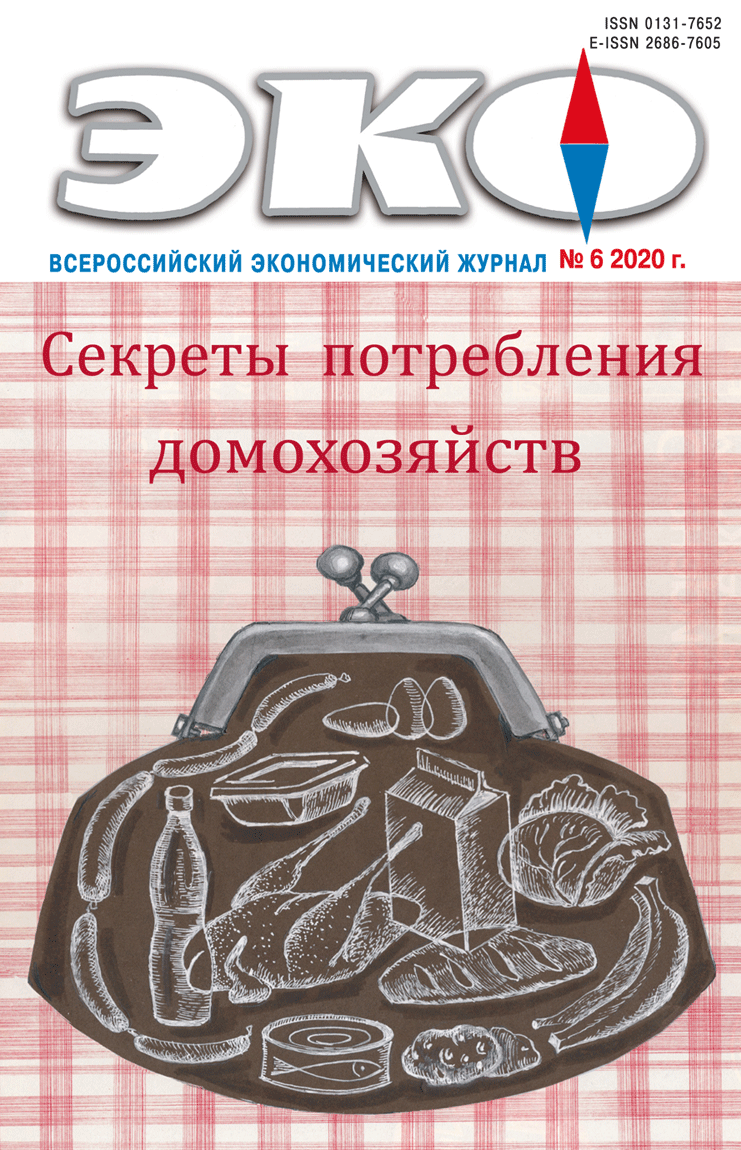MONITORING OF ECONOMIC TRANSFORMATION
Published 2020-06-01
Keywords
- economic growth,
- labor productivity,
- labor costs,
- sphere of material production,
- labor resources
- restrictions on labor resources,
- productivity of the economy,
- efficiency,
- conditionally effective employment,
- forecast ...More
How to Cite
1.
Uzyakova Е. Labor Productivity and Opportunities for Economic Growth. ECO [Internet]. 2020 Jun. 1 [cited 2026 Mar. 1];50(6):87-110. Available from: https://ecotrends.ru/index.php/eco/article/view/4048
Abstract
The paper analyzes labor resource limitations in Russian economy, the composition of unused labor resources and opportunities to attract them to an effective production process. The main factors that influence labor productivity (the level and dynamics of technological development and wages, the structural factor of economic growth) are considered, the possibilities of their growth and their impact on labor use efficiency are analyzed. Sectors of economy with significant reserves of labor productivity growth are identified. Estimates of labor productivity of conditionally effectively employed workers in the field of material production are given, depending on the level and dynamics of technological changes in certain sectors of economy. Production growth rates are divided into productivity growth and employment growth using a series of nominal (average annual, Rosstat statistics) and conditionally effective (author’s estimate) employment. The predictive and analytical tool that allows obtaining estimates of labor productivity depending on dynamics of gross output, productivity of primary resources, and the time factor are described in the paper. The tasks are solved using the methods of correlation and regression analysis. Estimates of key characteristics of the Russian economy forecast and the prospects for labor productivity growth (the base scenario and the investment scenario, which provides for a significant acceleration of investment dynamics) are given.References
- Восстановление экономического роста в России. Научный доклад ИНП РАН. 2016. 32 с.
- Ивантер В. В. Рецепт Обломова – меньше работаешь – лучше живешь// Эксперт. 2019. № 36 (1132). [Эл. pесурс]. URL https://expert.ru/expert/2019/36/retsept-oblomova-menshe-rabotaesh—-luchshe-zhivesh/
- Кейнс Дж. М. Общая теория занятости, процента и денег. XX век Классики экономической науки. М.: Гелиос АРВ, 2002. 352 с.
- Кузьмин В. В., Кузнецов С. Г., Мухина И. И., Мисюряев С. Г. Моделирование и инструментальные средства прогнозирования отработанного рабочего времени. Научные труды ИНП РАН. М.: МАКС Пресс, 2012. С. 148–174.
- Потапенко В. В. Пенсионная система в структуре российской экономики. Дисс. 2018. 150 с.
- Трансформация структуры экономики: механизмы и управление. Монография/ Под науч. ред. А. А. Широва. М.: МАКС Пресс, 2018. 264 с.
- Узяков М. Н. Эффективность использования первичных ресурсов как индикатор технологического развития: ретроспективный анализ и прогноз // Проблемы прогнозирования. М.: Наука/Интерпериодика, 2011. № 2. 3–18 с.
- Узякова Е.С., Узяков М. Н. Занятость и эффективная занятость в российской экономике // Проблемы прогнозирования. М.: Наука/Интерпериодика, 2011. № 6 (129). С. 89–101.
- Узякова Е. С. Альтернативные подходы к оценке возможностей роста сферы материального производства в условиях ограничений со стороны трудовых ресурсов. Дисс. 2016. 201 c.
- Узякова Е. С. Анализ и прогнозирование занятости и затрат труда в российской экономике // Проблемы прогнозирования М.: Наука/Интерпериодика, 2015. № 4 (151). С. 58–70.
- Широв А. А. Система мер по восстановлению экономического роста в России. Проблемы прогнозирования М.: Наука/Интерпериодика, 2018. № 1. С. 3–9.
- Экономика труда и социально-трудовые отношения. Под ред. Г. Г. Меликьяна, Р. П. Колосовой. М.: Изд-во МГУ, Изд-во ЧЕРО, 1996. 623 с.
- Яременко Ю. В. Теория и ме тодология исследования многоуровневой экономики. Книга 1. М.: Наука, 1997. 400 с.

